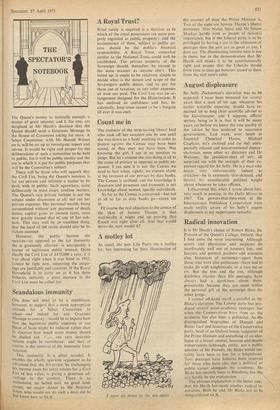Radical innovation
It is Mr Heath's choice of Robert Blake, the Provost of the Queen's College, Oxford. that I find quite the most interesting. Although actors and physicians and surgeons do inordinately well out of honours lists, and lawyers and portrait painters and scientists also, historians of eminence—apart from those who were also politicians—have had to make do with knighthoods. or a rare om or cu. But the oms and the cus, although doubtless classier than life peerages, have always had a quirk i ness about them. presumably because they are more within the personal gift of the sovereign than the other gongs.
I cannot off-hand recall a parallel to Mr Blake's elevation. The Labour party has pro- duced several quasi-academic peerages; but when the Conservatives have done so. the academic has also been a politician. As the .distinguished biographer of Disraeli and Bonar Law and historian of the Conservative party, head of an Oxford house, supporter of the Prime Minister and something of an ideo- logue of a broad, central, humane and decent conservatism (although, oddly, not a public admirer of Mr Powell), Mr Blake would cer- tainly have been in line for a knighthood.. Tory peerages have hitherto been reserved for those who have also run a political or public career alongside the academic. Mr Blake has recently been to Rhodesia, but this
can hardly be the explanation. , The obvious explanation is the better one: that Mr Heath has made another radical in- novation. Both he and Mr Blake are to be congratulated on it.






































 Previous page
Previous page